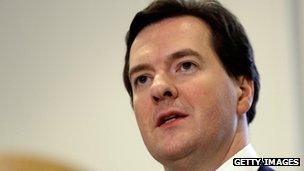Can George Osborne break free of events at crucial pre-Budget meeting?
- Published
- comments

Today may turn out to be the day when the most significant economic decisions of the year are taken.
This is the day when the chancellor and a small team of senior civil servants and political advisers gather at his country retreat Dorneywood to discuss what to do in the Budget on 20 March.
Having battled their way through the snow, Team Osborne will find a warm welcome awaits at the Queen Anne-style mansion set in over 200 acres of Buckinghamshire countryside. The housekeeper will, no doubt, welcome them with tea and freshly baked scones by a roaring log fire.
But when the Treasury's top mandarin Sir Nicholas Macpherson makes his presentation, the news he will bring is likely to be as chilly as the weather outside.
Sir Nick, a languid old Etonian with a sardonic sense of humour, is a veteran of such occasions.
It was at Dorneywood in 2008 that the permanent secretary to the Treasury peeled an apple with his pocket pen knife and broke the news to the then Chancellor Alistair Darling that borrowing was set to rise over £100bn, Darling cheered himself up by going to a concert by that muse of the miserable Leonard Cohen.
Today the news looks scarcely more cheering.
The lack of growth has seen borrowing rise this year, not fall as planned; the target George Osborne set for repaying Britain's debt looks like a distant dream; the age of austerity has already been extended to at least 2018 and now the Institute for Fiscal Studies is warning of the need for £12bn in tax rises after the next election.
The question today is how will Osborne react. Up until now he has relied on the loosening of monetary policy by the Bank of England - which he hopes the new Governor will take much further - and schemes to encourage the private sector to invest in building homes and the nation's infrastructure.
Critics argue that he should allow borrowing to rise even further in the short term to directly fund capital spending. His answer has always been that an extra £10bn, say, of spending would produce no noticeable improvement in growth, whereas loss of fiscal nerve would cause panic in the markets.
On the face of it then, the chancellor has few options at Dorneywood. However, George Osborne will not want to appear to be like the other people who use his country retreat when he is not.
The house in which he and his advisers gather today is used to de-brief and to rehabilitate British citizens who have been held captive abroad. Many of the country's most famous hostages have stayed here before enjoying their freedom.
Will the Chancellor find a way to break free or will he leave Dorneywood a hostage to events?